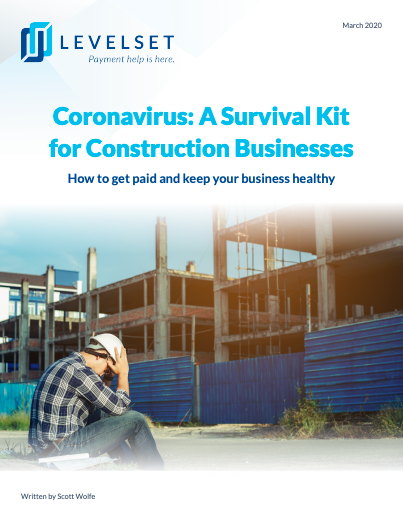
As COVID-19 spreads, contractors and suppliers across the country will likely mobilize to build field hospitals, tents, and supporting facilities to keep up with patient increases. The construction businesses involved will likely be wondering: How can I protect my payments on a field hospital project? If I don’t get paid, am I allowed to file a mechanics lien or bond claim?
Building field hospitals to fight coronavirus
As the coronavirus continues to spread throughout the country, an increasing number of hospitals and clinics will hit maximum capacity. This is driving the construction of temporary field hospitals to meet the demand for beds and treatment. In many countries, they have already become an essential weapon in the fight against this pandemic. In Seattle, construction has already begun on a 200-bed field hospital. Hospitals in New Orleans are also installing tents to accommodate anticipated spikes.
If you have a military background, or are a fan of the show M.A.S.H, a field hospital needs no explanation. But for the uninitiated, a field hospital is essentially a tent that provides shelter for patients, staff, supplies, and equipment. It is a temporary solution that can increase hospital capacity for a period of time, before being dismantled and carried away.
Though they are mobile, temporary facilities, field hospitals can be quite complex. Construction typically requires the work of electricians, carpenters, metalworkers, plumbers, and more.
Coronavirus and the construction industry
The construction industry is only beginning to feel the impact of the coronavirus. According to an AGC survey, most construction businesses are still seeing business as usual, even as cities beginning to shut down construction projects entirely.
You may be looking to take on any work you can get your hands on, just to keep money coming in and the bills paid. This could include building some of these field hospitals or other temporary medical structures. While it may be a good idea to take on these projects, it is important to understand your payment rights in this situation.
Field hospitals & mechanics lien rights
Though they vary state-by-state, laws generally require that a project result in a permanent improvement in order for workers to qualify for lien rights.
A simple rule of thumb: “No permanent attachment? No lien rights.”
Because field hospitals aren’t considered a permanent improvement, you will likely NOT be able to file a lien for unpaid work on a field hospital. Temporary tents or mobile structures do not meet the requirements in most states.
Field tents are clearly a construction project that results in a benefit for the hospital (and in this case, for humanity). Despite this fact, it is highly unlikely that you will be afforded lien rights on this type of project.
Lien rights for temporary structures aren’t always clear
n some states, like Louisiana, there is some language in the law that leaves an opening to question lien rights for temporary structures.
According to Louisiana’s mechanics lien statute, “lienable work” must be:
“A single continuous project for the improvement, construction, erection, reconstruction, modification, repair, demolition, or other physical change of an immovable or its component parts.”
The phrase “or other physical change” is what leaves the room for interpretation. Erecting a field hospital tent certainly falls under that umbrella, and the statute doesn’t specifically say that the physical change must be permanent to qualify for lien rights. However, since the other things mentioned in the statute result in a permanent change, it is likely that a judge would rule that a hospital tent would have to meet that requirement as well.
So what does this mean for your ability to file a lien against a field hospital construction project in Louisiana? Much like the rest of the country, you probably can’t – but it may be worth looking into further. The lesson here is that it may be worth doing some digging into the mechanics lien laws in your state, especially in these unprecedented circumstances.
4 tools to get paid for field hospital construction
If filing a mechanics lien isn’t an option, don’t panic just yet. You still have a number of options at your disposal to secure or speed up your payment.
Here are 4 tools that can help contractors & suppliers get paid:
1. Preliminary Notice
Sending preliminary notice can help even if you don’t have the right to file a mechanics lien. Sending a preliminary notice at the start of a project can help set payment expectations, and open the lines of communication. Both can help you if a dispute does arise.
2. Invoice Reminders
A simple invoice reminder can save a ton of effort and frustration down the road. Mailing clear, consistent reminders before the payment is due, at the due date, and potentially after is a good practice to incorporate into your everyday business. Not only do reminders help you get your money, they help build trust, reduce stress, and avoid unpleasant confrontations.
3. Demand Letters
A demand letter is the next step once the invoice due date has passed. In addition to getting more attention than a phone call, demand letters can serve as evidence if the payment dispute escalates. You can space several demand letters out, and use an increasingly aggressive tone in your specific demand for payment.
4. Breach of Contract
For most contractors, pursuing a breach of contract is an option of last resort, as this is a full-blown lawsuit.
An Unpredictable Future
The continued spread of the coronavirus has the ability to throw a wrench in your current and future projects.
If the opportunity to build a field hospital does arise, be aware that you’re not likely to be afforded lien rights. That doesn’t mean they aren’t worth doing. Just be aware and take proper precautions to protect your payments…and yourself.

